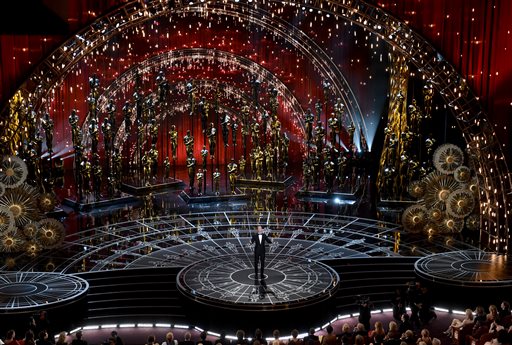A new meaning to Hollywood: Oscars shine the spotlight on the world

Host Neil Patrick Harris speaks at the Oscars on Sunday, Feb. 22, 2015, at the Dolby Theatre in Los Angeles. (Photo by John Shearer/Invision/AP)
February 24, 2015
After four hours of red carpet fashion fawning and awkward interviews in pre-entertainment specials, finally the trumpets sounded and out walked a tuxedo-clad Neil Patrick Harris. The Oscars had begun.
In true Oscar fashion, the show was opened by a classy performance of “Moving Pictures,” a song written for the occasion by the composers of Frozen, with Neil Patrick Harris joined by Into the Woods star Anna Kendrick, as well as Jack Black. It was clear from the onset that this would be no Grammys, filled with provocative performances, but rather an earnest attempt at sentimental appreciation for the art of film. Even the stars’ style was the epitome of high society taste with simple and elegant silhouettes in the season’s classic colors.
Surprisingly, the most exciting parts of the night were not the awards themselves, which were given out mostly as expected, but rather the acceptance speeches. It seemed as if the stars had collectively had an epiphany, realizing that the Oscars stage was not only a place to express thanks, but also a massive social soapbox. With billions of viewers across the world, winners took their time in the spotlight to express the importance of today’s most pressing, if not controversial, issues. Patricia Arquette, taking best supporting actress for her role in Boyhood, used her time to emphasize the need to close the wage gap for women, a sentiment enthusiastically cheered on by supporters Meryl Streep and Jennifer Lopez. Dana Perry, winning the award for Best Documentary Short Subject for her film Crisis Hotline: Veterans Press 1, spoke out about her son’s suicide and the need for mental health awareness. Eddie Redmayne dedicated his Best Actor award for The Theory of Everything to those fighting ALS, while screenwriter Graham Moore encouraged kids to “stay weird,” in the face of ridicule. The night was rounded out with commentary on the immigration crisis by director of the Best Picture winning Birdman, Alejandro González Iñárritu.
While the actors and actresses themselves seemed to realize their soapbox this year, it was also a testament to the progressive movement of modern films. Emphasized throughout the show, cinema is meant to make us feel and change the way we think, and this year’s nominees did just that. Providing narratives that shed light on lesser known diseases and issues as well as the hot-button questions of our time, this year was a remarkable one for film, and the stars took advantage of that, choosing to continue carrying the torch, keeping the conversation going, even off the big screen.
The Oscars sought to bring out the heart represented through their nominated films, and I have to say they were successful. The show’s most moving moment, though there were numerous to choose from, was a performance by John Legend and Common of Original Best Song winner, Glory, taken from the civil rights movement film, Selma. Moving even a stoic Chris Pine to tears, the performance and following acceptance speech were respectful, eloquent, and powerful, providing an example of the true artistry and importance that can still be found behind the gaudy lights and cameras of over-publicized award shows.
In a seemingly random but endearing dedication to The Sound of Music, none other than Lady GaGa arrived to give a shockingly good performance of a medley of the film’s best-loved music. Quality rather than quantity was the theme of the night, and though the show seemed to move a bit slower than the typical dizzying chaos of other award shows, it was worth it.
Taking their time on the soapbox, Hollywood’s best and brightest made the Oscars a worthwhile tribute to today’s most important issues, making a show typically filled with superficial fluff rather an inspiring reflection on the things that matter most.








